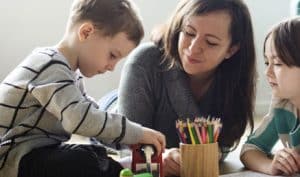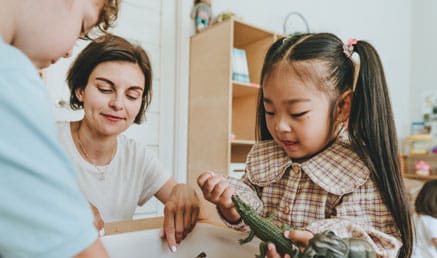
“It’s our polite nudge in the ribs to help you and your team stay organised and on task.”
This week’s subject is: Collaborative learning
Element 5.2.1: Children are supported to collaborate, learn from, and help each other.
How does your service provide a range of opportunities for children to engage and collaborate with others in social and co-constructed experiences to support their learning and development?
Children engage in collaborative learning in education and care settings by working together in pairs or small groups as they engage in play-based learning experiences. Children are provided with greater opportunities to build their communication, social skills, work together to problem solve and learn from each other, building their confidence and experiencing a sense of autonomy over their learning.
Children learn about collaboration when educators model effective collaborative learning through their interactions with children and each other. By acknowledging and encouraging children collaborating and cooperatively engaging, educators support children to explore, build confidence and develop greater independence.
Older children can challenge and extend their own thinking, and that of others, and create new knowledge in collaborative interactions and negotiations with peers. By exchanging ideas and collaborating with others, older children can also learn life and social skills, such as conflict resolution and negotiation skills. Guide to NQF
Consider the following when reflecting with your team:
How do we engage children in age appropriate, purposeful and relevant shared decision making?
How do educators plan and create opportunities for children to collaborate with others to progress their learning?
What opportunities do we provide for children to take on leadership roles and direct play and learning experiences with their peers?
How do we acknowledge, show support and encouragement when effective collaborative learning is occurring?
Do educators respond sensitively to older children’s complex relationships with their peers and intervene in ways that promote social inclusion?
How do we support children from diverse backgrounds and abilities during collaborative play experiences and projects?
What range of opportunities do we provide for children to make decisions about their own learning?
How do we plan the program and routines to ensure adequate time for children to engage in uninterrupted play experiences and projects of their own choosing, with a variety of peers and adults?
Resources:
QA5- Relationships with Children
Collaborating with Children for Effective Programming: Self-Guided Learning Package
Within System7 go to Quality Area 5/Module 5 to submit self-assessment notes and if required, open a QIP issue if you identify any areas of improvement.
The Childcare Centre Desktop has a range of resources to assist services with quality area 5. These include Interactions with Children, families and Staff Policy, Educational Program Policy, Program Template, Observation Record, Critical Reflection Template, Behaviour Guidance Guide Promoting and Supporting Positive Behaviour and much more.
Resources, NQS Element, Regulation and System7 links:
Childcare Centre Desktop – Childcare Centre Desktop
National Quality Standard – QA5/ 5.2.1- Collaborative Learning
National Regulations – 73, 74, 155, 156
System7 Module – QA5/ Module 5
If you have any questions send us a note via the Contact page here!




